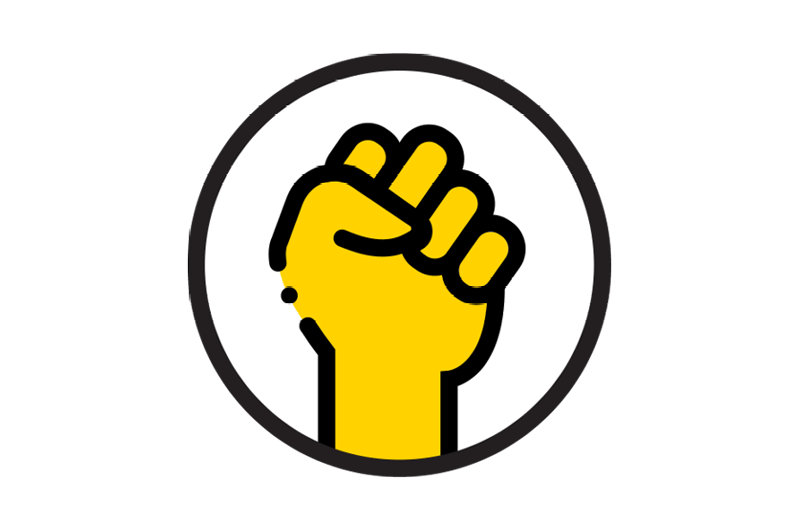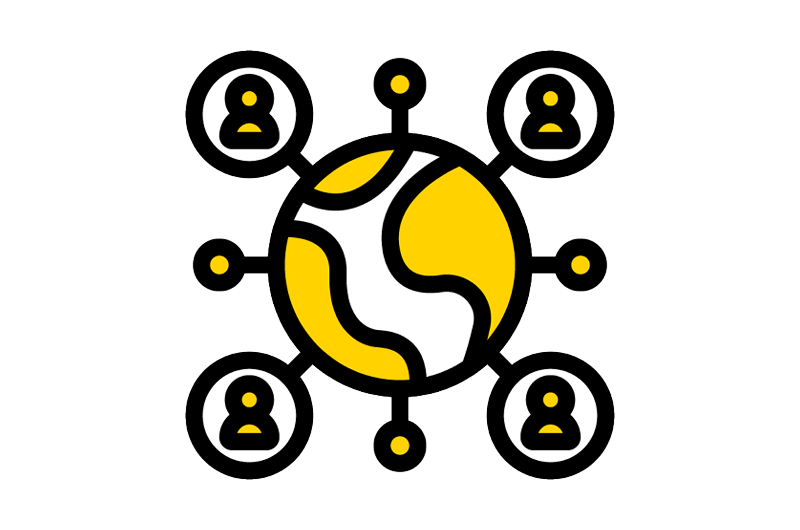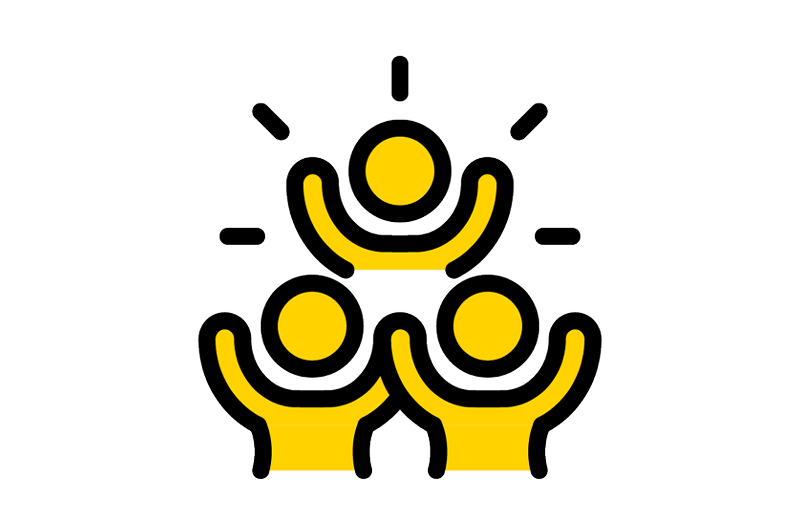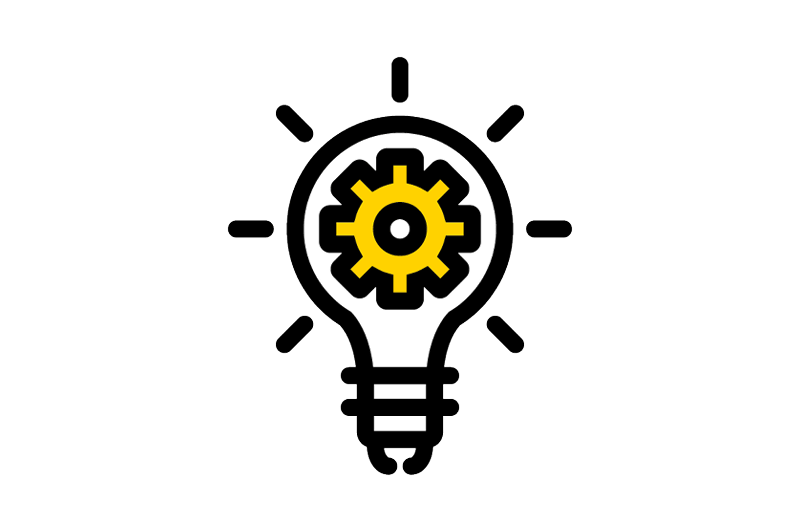Strategic Goals and Initiatives
Based on our mission, vision, and values, these are the Libraries' major goals, strategies, and initiatives.
Goal Areas

Advance the Public Good
Promote democracy, social justice, and equitable participation in society.

Expand Our Reach
Strengthen the Libraries’ positive influence, impact, and reputation through new and existing strategic partnerships.

Invest in Our People and Our Purpose
Ensure the Libraries’ ability and capacity to uphold and advance its mission.

Reimagine Library Excellence
Use creative, human-centered approaches in our programs, services, and spaces.
Strategies and Initiatives
Advance the Public Good
- Undertake a comprehensive review and redesign of the Information for People with Disabilities webpage and associated services.
- Expand work in the Library Accessibility Alliance (LAA) and BTAA’s accessibility workgroup.
- Provide captions/transcripts for key digital videos in our collection that are used often for teaching and learning.
- Continue to participate in the UMD Impact Award-funded “Maryland Institute for Digital Accessibility” (MIDA).
- Continue efforts to improve and increase accessibility across all library programs, services, resources, and spaces.
- Launch the major new exhibition, “Rising Up: 100 Years of Student Activism for Justice and Civil Rights at the University of Maryland” and carry out associated outreach and educational programming.
- Implement library and IDEA (Inclusion, Diversity, Equity, and Accessibility) Committee-driven initiatives, including promotion and educational programming around heritage months.
- Continue Project STAND (Student Activism Now Documented) Mellon-funded initiative with Atlanta University Center.
- Continue “Advancing Workers Rights in the American South,” collaboration with Georgia State University funded by Council on Library & Information Resources (CLIR). (Read more.)
- Continue providing cross-campus leadership of the 1856 Project.
- Implement the Libraries’ new Living Democracy initiative (LDI) programs, digital exhibit, and symposium in 2024. (Read more.)
- Participate in the UMD Impact Award-funded “Democracy Research, Education, and Civic Action” initiative with the College of Education.
- Partner with TerpsVote in 2024 and collaborate with others to increase voter registration and provide civic engagement resources from the Libraries.
- Partner with ARHU on the Frederick Douglass Center for Leadership in the Humanities.
- Explore and, if feasible, lead and coordinate a cross-campus and community initiative “UMD Native Circle,” to address Native/Indigenous issues and concerns.
Expand Our Reach
- Participate in multiple, high-impact BTAA BIG Collection initiatives, including expansion of our shared-print initiatives and policy harmonization.
- Expand promotion and use of major consortium-based collections and data, including memberships in the Center for Research Libraries (CRL), HathiTrust, and the Inter-University Consortium for Political and Social Research (ICPSR).
- Provide leadership for USMAI as the consortium implements its next integrated library system, ExLibris’s Alma/Primo platform. (Read more.)
- Partner with and provide work for improvement of data discovery systems, while leveraging linked-data solutions already achieved for digital collections.
- Advance our digital preservation efforts through membership in APTrust, including facilitating the engagement of other USMAI libraries with the APTrust community.
- Partner with ARHU’s Department of History and the History and Library Science Master of Arts (HiLS) dual-degree program on the NEH Grant-funded project, “Slavery, Law, and Power in the Archives,” if funded.
- Partner with HELIOS, University of Michigan, and the American Anthropological Association (AAA) to develop and carry out an NEH digital humanities national convening grant, “Advancing a collaborative and inclusive vision for open anthropological scholarship,” if funded.
- Continue to strengthen campus partnerships to advance student success and enhance student experiences and explore the possibility of restarting a student outreach team.
- Leverage already-digitized content from the Historic Maryland Newspapers Project for innovative research.
- Participate in the Program for Cooperative Cataloging (PCC) and other initiatives advancing the future of descriptive metadata both within the U.S. and internationally.
- Participate in the Social Networks and Archival Context (SNAC) project to improve UMD Libraries’ data representation and enhance the discovery of our archival resources on the open web.
- Gain independence in three formats beyond books with participation in the OCLC Member Merge Program: scores, sound recordings, and visual materials. Merge national-level records to remove duplicates in ways that assist acquisitions, catalogers, and resource sharing efforts across the globe.
- Continue the DC Punk Fanzines digitization and programming initiative.
- Continue White House Correspondents Association (WHCA) Pool Reports initiative.
Invest in Our People and Our Purpose
- Begin new donor-funded Library Fellows for Inclusive Excellence pilot program.
- Continue to analyze and address staff and faculty salary compression and equity cases, as funding allows.
- Hold a Supervisors Summit in Summer of 2023 and use results to implement a library-wide supervisors training and team-building programs.
- Address climate survey and focus groups’ results to enhance organizational culture, engagement, and morale.
- Examine Libraries’ governance structures and meeting patterns to encourage more participation while at the same time reducing unnecessary meetings.
- Explore new models for funding professional development for staff and faculty.
- Create a style guide and communications toolkit to give staff and faculty a shared language to tell the story of the Libraries and improve culture and morale.
- Explore ways to welcome and build affinity among new Libraries employees.
- Continue to invest in and provide leadership training opportunities for emerging leaders.
- Upgrade and redesign the Libraries’ intranet to an improved platform and create protocols for flexible participation in new internal communication channels.
- Participate in campus’s Elevate system migration in 2023-2024.
- Decommission REDCap system and services and shift focus to building research data discovery, curation, and preservation services.
- Enhance data visibility and governance in order to develop a more data-informed culture.
- Complete the migration out of our legacy administrative system for digital collections.
- Move the public web presence for digital collections (https://digital.lib.umd.edu/) to Drupal content management system.
- Investigate and implement a communications digital asset management system for Libraries' photography and graphics.
- Continue to improve asset management systems for easier analysis and greater availability across interested units as part of the Drive to Digital Transformation (Dx) for Digital Collections and infrastructure.
- Transform our online application and storage environment through optimization and alignment of our physical data center, cloud hosting, vendor hosting, and commercial off-the-shelf products.
- Relocate and enhance the Libraries’ Preservation Lab.
- Expand and enhance the Libraries’ Digitization Center Unit (DCU) spaces and functions in Hornbake Library.
- Refresh selected interior spaces and furnishings of McKeldin Library and selected other libraries.
Reimagine Library Excellence
- Analyze LibQUAL user survey’s results and implement strategic improvements.
- Produce an impact report demonstrating our alignment with institutional plans and priorities.
- Lead cross-campus efforts to recognize and celebrate UMD faculty authors who have published books in the previous academic year.
- Continue Phase 3 of the Redefining Our Collections initiative.
- Continue Library Scholars Trust initiative.
- Hire a new OER Librarian to assist in advancing the OER (Open Education Resources) and Affordability Initiative.
- Participate in the BTAA Student Success collaboration.
- Develop and implement a campus-wide communication campaign to promote services to students and other library users, leveraging the campus’s Salesforce platform to expand reach of the Off the Shelf e-newsletter.
- Continue to deepen outreach and resources for transfer students, first-generation students, and other unique student populations.
- Continue BTAA (Big Ten Academic Alliance) Social Justice Pedagogy/Critical Pedagogy initiative.
- Continue BTAA Discovery to Delivery initiative.
- Continue Diversity General Education integration.
- Design and build the new StoRI Lab (Storytelling and Research Innovation Lab) in McKeldin Library and provide associated programs for campus community. (Read more.)
- Design and implement new Creative Laboratory in MSPAL (Michelle Smith Performing Arts Library).
- Enhance the STEM (Science, Technology, Engineering & Mathematics) Library’s MakerSpace facilities and services.
- Implement the Libraries’ new discovery platform, Primo, which is part of the extensive USMAI Library Management System migration.
- Refresh McKeldin’s study carrels and group meeting rooms and renovate and repurpose McKeldin’s 5th floor.
- Explore ways to leverage Avalon system to deliver streaming media reserves and obsolete media formats on demand to library users.
- Explore ways digital and physical signage can be used more effectively through multiple library facilities. Upgrade physical signage in McKeldin Library for maximum flexibility.
- Identify a location in McKeldin Library for a student-centered lounge and work with Head of Student Engagement Services and other stakeholders on design and implementation.
- Beautify library spaces with conversational pieces, art, and archival imagery to foster human connection.
- Continue initiative to improve indoor wayfinding using GIS (Geographic Information System).
- Explore AI applications and pedagogy, including automated research help, either through AI or through existing tools such as Springshare’s Chatbox to help users discover and leverage curated library data and content.
- Conduct a research data needs assessment to inform work around distributed data services, curation, and management.
- Conduct a second round of TOME (Toward an Open Monograph Ecosystem) awards and publications.
- Advance work of UMD PACT and other open access initiatives, including response to OSTP (The White House's Office of Science & Technology Policy).
- Implement a two-year pilot of Dryad and Qualitative Data Repository platforms for campus’s use in response to new Equitable Access policy and OSTP-related research requirements.
- Continue implementation of Open Scholarship Services, Equitable Access policy, and research data management changes.
- Continue BTAA Open Access initiatives.